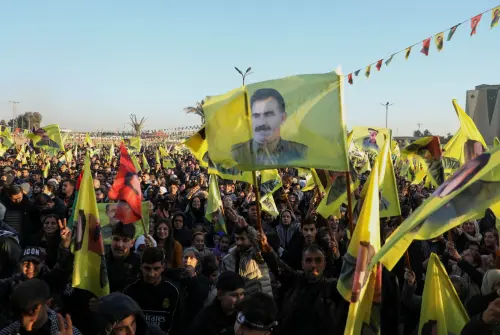Following a sudden withdrawal of U.S. forces from northeastern Syria, Turkey has launched a military operation in the region against Syrian Kurdish fighters, who have helped the United States battle the Islamic State. Brookings Foreign Policy experts analyze the developments and ramifications.
 Amanda Sloat (@A_Sloat), Robert Bosch Senior Fellow in the Center on the United States and Europe: As I recently wrote elsewhere, the policy of assisting a faction of Syrian Kurds, the YPG, to fight the Islamic State has been a ticking time bomb since it began under the Obama administration, in 2014. The short-term imperative to combat ISIS created a strategic contradiction with foreseeable consequences that are now on painful display. Turkey, a NATO member, never accepted U.S. support for the group, which is directly linked to a terrorist organization that has long fought an insurgency against the Turkish state. Nor did every politician now criticizing Trump — whose decisionmaking has been characteristically chaotic — think this alliance was wise in the first place. The main surprise here is that U.S. diplomats and military officers made this untenable situation work as long as it did.
Amanda Sloat (@A_Sloat), Robert Bosch Senior Fellow in the Center on the United States and Europe: As I recently wrote elsewhere, the policy of assisting a faction of Syrian Kurds, the YPG, to fight the Islamic State has been a ticking time bomb since it began under the Obama administration, in 2014. The short-term imperative to combat ISIS created a strategic contradiction with foreseeable consequences that are now on painful display. Turkey, a NATO member, never accepted U.S. support for the group, which is directly linked to a terrorist organization that has long fought an insurgency against the Turkish state. Nor did every politician now criticizing Trump — whose decisionmaking has been characteristically chaotic — think this alliance was wise in the first place. The main surprise here is that U.S. diplomats and military officers made this untenable situation work as long as it did.
Trump’s hasty decision to withdraw U.S. advisers from the Syrian border, and at least tacitly approve a Turkish military operation, was sloppy and cruel. The lack of a coherent policy process and garbled messaging made a dangerous situation even worse. Renewed fighting will harm civilians in a now peaceful part of a war-torn country, enable the Islamic State to regroup, and empower Russia and Iran, who are backing the Assad regime and hungry for more influence.
Ending the alliance with the YPG may be inevitable, but Trump’s critics are right that the United States can’t simply walk away without tarnishing its reputation as a reliable partner. With Turkey’s Operation Peace Spring now underway, the United States should insist it be limited in scope and not target major Kurdish-controlled towns, that it ensure that Islamic State prisoners held by the YPG are not released, and that it not provoke a humanitarian crisis among civilians. The United States should continue supporting efforts to find a political solution to the broader conflict in Syria, including decisions about long-term governance and security arrangements.
Despite deep frustration with Turkey’s strongman leader, the United States must preserve its relationship with that country. It is a challenging ally and has strayed from NATO principles — for instance, by purchasing Russian military equipment and by cracking down on political opponents and the press. But it remains an important Muslim-majority ally in a critical region. And, given its geography, it has a clear interest in a stable Syria. The United States should remain focused on ensuring that the Syrian neighbor with the most to lose remains invested in the efforts to decisively defeat the Islamic State.
 Kemal Kirişci (@kemalkirisci), TÜSİAD Senior Fellow in the Center on the United States and Europe; Director of the Turkey Project: Having received a green light from President Trump, Turkish President Recep Tayyip Erdoğan launched “Operation Peace Spring” (Barış Pınarı Harekatı) this week. However, there is considerable skepticism that this intervention will actually serve the cause of peace in Syria and help address Turkey’s own mounting domestic problems.
Kemal Kirişci (@kemalkirisci), TÜSİAD Senior Fellow in the Center on the United States and Europe; Director of the Turkey Project: Having received a green light from President Trump, Turkish President Recep Tayyip Erdoğan launched “Operation Peace Spring” (Barış Pınarı Harekatı) this week. However, there is considerable skepticism that this intervention will actually serve the cause of peace in Syria and help address Turkey’s own mounting domestic problems.
Many level-headed people are warning the government in Turkey that, to paraphrase a Turkish expression, it should “not to go down a well with Trump’s rope.” In other words, Turkey risks getting sucked into an even worse quagmire than the one it already faces. There are also concerns about whether the operation would be able to manage the challenge of dealing with thousands of ISIS fighters and their families without aggravating the situation in Syria and undermining Turkey’s own security.
However, Erdogan is apparently in no mood to listen to reason. He is riding a wave of nationalism that is systemically whipped up by pro-government media and enjoying this distraction from the deepening economic woes of the country. That is why Trump’s threat to obliterate the Turkish economy caused the Turkish currency to lose value.
Domestically, there is also great concern about how this operation will impact relations with Turkey’s own Kurdish minority, not to mention the shrinking Kurdish electoral base of Erdoğan’s Justice and Development (AKP) party. Kurdish voters played a critical role during the last local elections, which culminated in bitter defeats for AKP candidates across major cities, including Istanbul. There will also be pressure on Erdoğan to deliver on his promise of sending Syrian refugees home, which would violate the principle of non-refoulement (engrained in international and also Turkish national law).
Time will tell whether this operation was well thought-out and its pros and cons well-calculated. In any event, the incursion will enter the annals of Turkish foreign policy as a decisive break from the long established precept not to get involved or intervene in the affairs of neighboring countries, a precept that had served the Turkish Republic had largely been sustained since its foundation in 1923 until Erdoğan’s aspiration to bring about regime change in Damascus between 2011 and 2015. It may also come to be remembered as an operation that symbolizes the weakening of the once Western-led international order and Turkey’s possible final break from whatever is left of the West.
 Michael O’Hanlon (@MichaelEOhanlon), Senior Fellow and Director of Research for Brookings Foreign Policy; Omer Taspinar (@otaspinar), Nonresident Senior Fellow in the Center for 21st Century Security and Intelligence: As we recently wrote elsewhere, Trump has conflicting campaign promises, it would appear — defeat ISIS and al-Qaida on the one hand, bring back U.S. troops from frustrating and long deployments abroad on the other.
Michael O’Hanlon (@MichaelEOhanlon), Senior Fellow and Director of Research for Brookings Foreign Policy; Omer Taspinar (@otaspinar), Nonresident Senior Fellow in the Center for 21st Century Security and Intelligence: As we recently wrote elsewhere, Trump has conflicting campaign promises, it would appear — defeat ISIS and al-Qaida on the one hand, bring back U.S. troops from frustrating and long deployments abroad on the other.
 How to resolve such a contradiction? How about appealing, not only to common sense given the small size and considerable effectiveness of the American presence in Syria today, but to the Constitution that Trump was elected to uphold? That Constitution makes him commander in chief and charges the federal government with national defense as its first and paramount priority. In a situation where American troops are successfully defending the nation’s security interests abroad, in an economical and efficient manner, the onus should be on advocates any option that would weaken or end such a capability.
How to resolve such a contradiction? How about appealing, not only to common sense given the small size and considerable effectiveness of the American presence in Syria today, but to the Constitution that Trump was elected to uphold? That Constitution makes him commander in chief and charges the federal government with national defense as its first and paramount priority. In a situation where American troops are successfully defending the nation’s security interests abroad, in an economical and efficient manner, the onus should be on advocates any option that would weaken or end such a capability.
President Trump’s frustration with the forever wars is understandable. But in Syria, we have after years of policy failure, heartbreak, and danger to western Europe and North America, found an effective policy that involves very modest costs to the United States in blood and treasure. President Trump should celebrate and preserve this success rather than feel some need to end it.
 Jeffrey Feltman, John C. Whitehead Visiting Fellow in International Diplomacy for Brookings Foreign Policy: Lebanon, Iraq, and Syria have some political similarities: Politicians and political activists can be divided not only by confessional or ethnic identities but also as to whether they fall into a pro-West or pro-Iran camp. This divide has played out dramatically in Lebanon since the 2005 assassination of Rafiq Hariri, when the pro-West/anti-Damascus “Cedar Revolution” was undercut by Christian leader Michel Aoun’s decision to hitch his presidential ambitions to an alliance with Hezbollah. In all three countries, many people with finely attuned survival instincts try to position themselves on what they believe will be the winning side. A key element in their analysis is their perception regarding the resolve and strength of outside powers to intervene on behalf of one side or the other.
Jeffrey Feltman, John C. Whitehead Visiting Fellow in International Diplomacy for Brookings Foreign Policy: Lebanon, Iraq, and Syria have some political similarities: Politicians and political activists can be divided not only by confessional or ethnic identities but also as to whether they fall into a pro-West or pro-Iran camp. This divide has played out dramatically in Lebanon since the 2005 assassination of Rafiq Hariri, when the pro-West/anti-Damascus “Cedar Revolution” was undercut by Christian leader Michel Aoun’s decision to hitch his presidential ambitions to an alliance with Hezbollah. In all three countries, many people with finely attuned survival instincts try to position themselves on what they believe will be the winning side. A key element in their analysis is their perception regarding the resolve and strength of outside powers to intervene on behalf of one side or the other.
Between the lack of any significant U.S. response to Iran’s attack on Aramco’s Abqaiq facility followed now by the U.S. abandonment of its Syrian Kurdish allies, there will be many Lebanese and Iraqis who will conclude that now is the time to make their peace with the pro-Iranian elements in their countries. Syrians have already started reconciling themselves to the reality of Bashar Assad’s survival. But the betrayal of the Syrian Kurds will have a profound impact on the political balance in Lebanon and Iraq, undermining the attraction of the political forces closely allied with U.S. interests.
 Suzanne Maloney (@MaloneySuzanne), Deputy Director of the Brookings Foreign Policy program; Senior Fellow in the Center for Middle East Policy: In the simplistic, zero-sum depiction of the Middle East that dominates the Washington discourse, one might presume that Tehran is overjoyed at the Trump administration’s decision to green-light a Turkish incursion in northern Syria. After all, many of the justifiably vehement denunciations of the latest U.S. abandonment of the Kurds have suggested that Tehran will be one of the winners. However, in the complex struggle for influence across the region, nothing is ever as simple as it may seem from a distance. In fact, the Iranians have denounced the operation and backed up their rhetoric with actions, cancelling a planned visit by the speaker of the Iran parliament, Ali Larijani, to Turkey and hastily mounting a military exercise near Iran’s Turkish border. Tehran may indeed prove to be a beneficiary of Washington’s latest betrayal, but Iran’s leadership also has its own concerns with the Turkish intervention. Ultimately Tehran prefers that its ally, Syrian dictator Bashar Assad, reclaims the upper hand across Syrian territory — so long as Damascus continues to make room for Tehran’s assiduous involvement and long-term presence. And they see Ankara’s ambitions as risking a resurgence of ISIS or other Sunni extremist violence as well as potentially providing a launching pad for Kurdish separatists such as the PKK (Kurdistan Workers’ Party)-aligned PJAK (Kurdistan Free Life Party).
Suzanne Maloney (@MaloneySuzanne), Deputy Director of the Brookings Foreign Policy program; Senior Fellow in the Center for Middle East Policy: In the simplistic, zero-sum depiction of the Middle East that dominates the Washington discourse, one might presume that Tehran is overjoyed at the Trump administration’s decision to green-light a Turkish incursion in northern Syria. After all, many of the justifiably vehement denunciations of the latest U.S. abandonment of the Kurds have suggested that Tehran will be one of the winners. However, in the complex struggle for influence across the region, nothing is ever as simple as it may seem from a distance. In fact, the Iranians have denounced the operation and backed up their rhetoric with actions, cancelling a planned visit by the speaker of the Iran parliament, Ali Larijani, to Turkey and hastily mounting a military exercise near Iran’s Turkish border. Tehran may indeed prove to be a beneficiary of Washington’s latest betrayal, but Iran’s leadership also has its own concerns with the Turkish intervention. Ultimately Tehran prefers that its ally, Syrian dictator Bashar Assad, reclaims the upper hand across Syrian territory — so long as Damascus continues to make room for Tehran’s assiduous involvement and long-term presence. And they see Ankara’s ambitions as risking a resurgence of ISIS or other Sunni extremist violence as well as potentially providing a launching pad for Kurdish separatists such as the PKK (Kurdistan Workers’ Party)-aligned PJAK (Kurdistan Free Life Party).
Of course, with the chutzpah that suffuses the Islamic Republic’s regional approach, Iranian officials and the press have reveled in criticizing American inconstancy, slamming Washington as a “fair-weather friend” to the Kurds and calling on all sides to respect Syrian sovereignty. Across the Middle East and around the world, the unvarnished indifference of the Trump administration to American commitments, credibility, and values is generating an inflection point for regional security and American foreign policy. For half a century, Washington in cooperation with regional partners has been committed to defending the Persian Gulf and American interests in the Middle East from outside powers. That doctrine has frayed, not least by America’s own disastrous intervention in Iraq and our equally damaging response to the Syrian civil war. Still, the expectation of American engagement on behalf of its partners and interests was, until recently, a core pillar of regional security and American foreign policy. The underlying message of Trump’s casual readiness to jilt Kurds who were crucial to the U.S.-led anti-ISIS campaign, together with his failure to respond to last month’s attack on Saudi energy infrastructure, is that the United States has abdicated its traditional commitments in the Middle East. Our allies and our adversaries will make their calculations accordingly.
The Brookings Institution is committed to quality, independence, and impact.
We are supported by a diverse array of funders. In line with our values and policies, each Brookings publication represents the sole views of its author(s).










Commentary
Around the halls: Brookings experts’ reactions to Turkey’s incursion into Syria
October 10, 2019